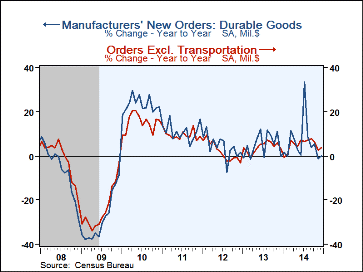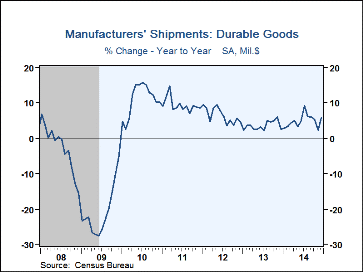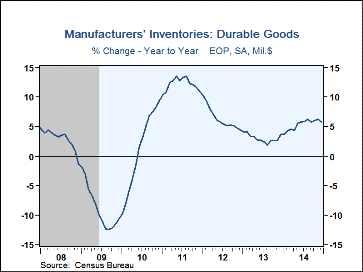 Global| Jan 27 2015
Global| Jan 27 2015U.S. Durable Goods Orders Are Depressed by Fewer Aircraft Bookings
by:Tom Moeller
|in:Economy in Brief
Summary
New orders for durable goods declined 3.4% during December (+0.3% y/y) following a 2.1% November drop, revised from -0.7% reported initially. The latest decline was the fourth in the last five months. A 55.5% collapse (-64.5% y/y) in [...]
New orders for durable goods declined 3.4% during December (+0.3% y/y) following a 2.1% November drop, revised from -0.7% reported initially. The latest decline was the fourth in the last five months. A 55.5% collapse (-64.5% y/y) in commercial aircraft bookings provided the impetus for the outsized shortfall. New orders beyond the transportation sector slipped 0.8% (+3.8% y/y), the third consecutive monthly decline. Orders were expected to rise 0.4% in the Action Economics Forecast Survey. During the last ten years, there has been an 88% correlation between the y/y change in orders and the change in real GDP.
Despite the latest decline, for all of last year durable goods orders firmed 6.1%, the largest gain in three years. Improvement was broad-based. Outside of the transportation sector, orders improved 5.0% for the year, about the same as they did in 2013.
The decline in aircraft orders during December was accompanied by a 2.7% rise (10.0% y/y) in motor vehicles & parts orders. Bookings were mixed outside of the transportation sector. To the downside, machinery orders fell a sharp 3.7% (-6.2% y/y), the fourth consecutive monthly decline. Primary metals bookings fell 1.5% (+2.6% y/y), down for the third straight month. Computers & related products orders declined 10.4% (-23.5% y/y), continuing their sharp downtrend. Communications equipment orders fell 1.6% (-6.7% y/y) after a 9.8% rise. To the upside were fabricated metals orders. The 1.0% rise (12.0% y/y) was accompanied by a 1.2% gain (2.6% y/y) in orders for electrical equipment and appliances.
Orders for nondefense capital goods were pulled 9.7% lower (-12.2% y/y) by the drop in aircraft. Orders outside of the aircraft sector fell 0.6% (+1.7% y/y), the fifth decline in the last six months.
Shipments of durable goods gained 1.1% (5.8% y/y) last month but edged just 0.2% higher (4.1% y/y) excluding the transportation sector. Unfilled orders for durables declined 0.8% (+10.1% y/y) while excluding transportation they fell 0.3% (+6.3% y/y). Inventories of durable goods gained 0.5% (5.8% y/y) and outside of transportation they also rose 0.5% (4.0% y/y).
The durable goods figures are available in Haver's USECON database. The Action Economics consensus forecast figure is in the AS1REPNA database.
| Durable Goods NAICS Classification | Dec | Nov | Oct | Y/Y | 2014 | 2013 | 2012 |
|---|---|---|---|---|---|---|---|
| New Orders (SA, %) | -3.4 | -2.1 | 0.3 | 0.3 | 6.1 | 5.2 | 4.1 |
| Transportation | -9.2 | -3.9 | 3.5 | -7.2 | 8.5 | 7.9 | 8.9 |
| Total Excluding Transportation | -0.8 | -1.3 | -1.2 | 3.8 | 5.0 | 4.0 | 2.1 |
| Nondefense Capital Goods | -9.7 | -1.6 | -0.0 | -12.2 | 6.2 | 8.7 | 3.7 |
| Excluding Aircraft | -0.6 | -0.6 | -1.8 | 1.7 | 4.4 | 5.0 | 2.1 |
| Shipments | 1.1 | -0.7 | -0.1 | 5.8 | 4.9 | 3.7 | 6.4 |
| Inventories | 0.5 | 0.4 | 0.5 | 5.8 | 5.8 | 3.8 | 4.5 |
| Unfilled Orders | -0.8 | 0.2 | 0.5 | 10.1 | 10.1 | 7.0 | 3.6 |
Tom Moeller
AuthorMore in Author Profile »Prior to joining Haver Analytics in 2000, Mr. Moeller worked as the Economist at Chancellor Capital Management from 1985 to 1999. There, he developed comprehensive economic forecasts and interpreted economic data for equity and fixed income portfolio managers. Also at Chancellor, Mr. Moeller worked as an equity analyst and was responsible for researching and rating companies in the economically sensitive automobile and housing industries for investment in Chancellor’s equity portfolio. Prior to joining Chancellor, Mr. Moeller was an Economist at Citibank from 1979 to 1984. He also analyzed pricing behavior in the metals industry for the Council on Wage and Price Stability in Washington, D.C. In 1999, Mr. Moeller received the award for most accurate forecast from the Forecasters' Club of New York. From 1990 to 1992 he was President of the New York Association for Business Economists. Mr. Moeller earned an M.B.A. in Finance from Fordham University, where he graduated in 1987. He holds a Bachelor of Arts in Economics from George Washington University.
More Economy in Brief
 Global| Feb 05 2026
Global| Feb 05 2026Charts of the Week: Balanced Policy, Resilient Data and AI Narratives
by:Andrew Cates










